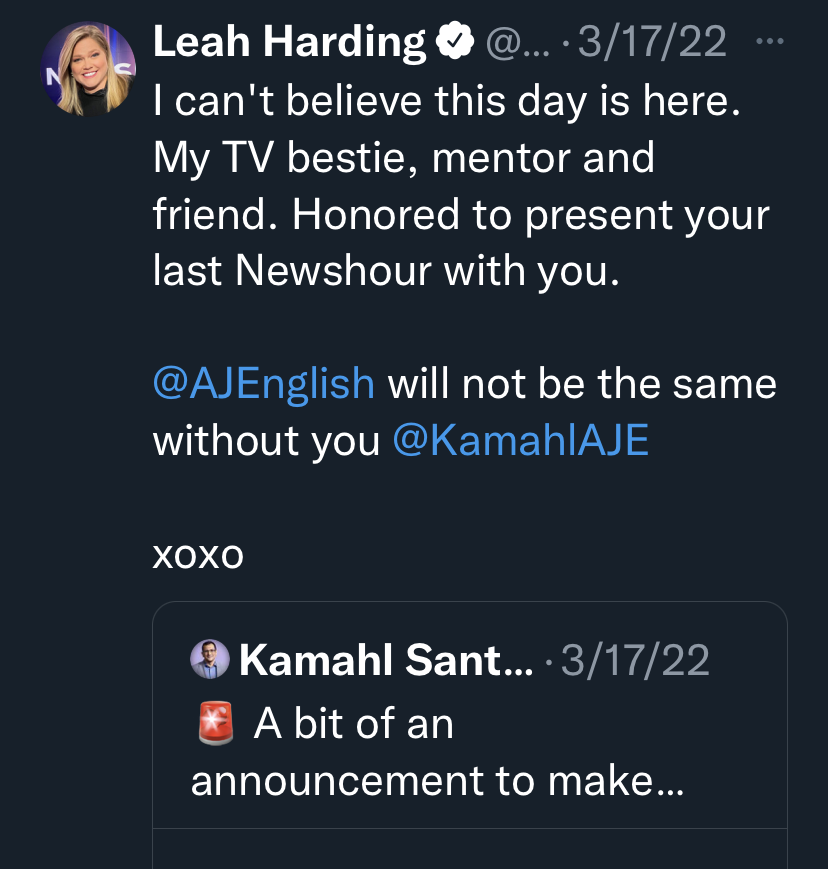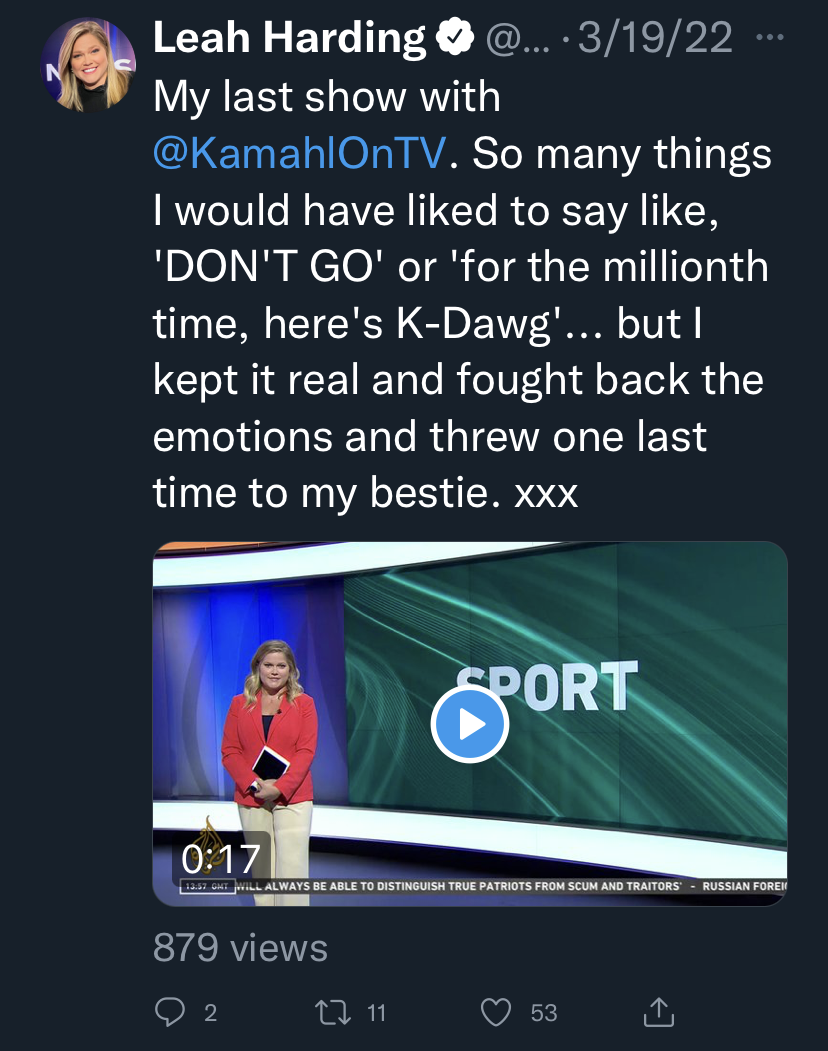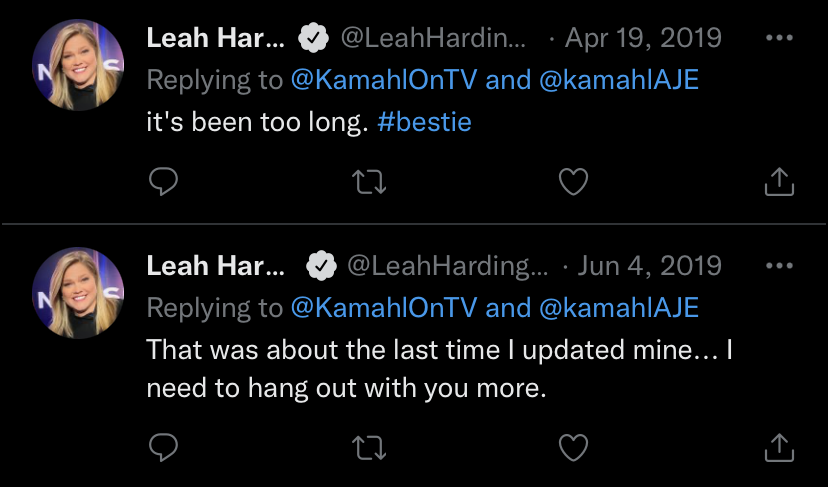Setting the record straight #1
/This article contains a side-by-side comparison of content.
It is best viewed on a desktop computer, laptop, or tablet.
For smartphones, please view in LANDSCAPE format.
This article contains a side-by-side comparison of content. It is best viewed on a desktop computer, laptop, or tablet. For smartphones, please view in LANDSCAPE format.
THE EVIDENCE & CONTEXT
WHAT WAS PUBLISHED
IMAGES CAN BE ENLARGED BY CLICKING ONCE; SLIDESHOWS CAN BE OPENED BY CLICKING ON ANY THUMBNAIL
This is the front page of New Zealand’s Sunday Star-Times newspaper on Sunday 19 June, 2022.
While it does say that I reject the allegations, it also uses the phrase “years of harassment”.
It is the prelude to an article which portrays my relationship with my former co-host as a work colleague only.
However the evidence - as presented to the journalist - demonstrates that we had more of a friendship than regular work colleagues do, and that that was a major factor in the interactions we had.
Here is my former co-host’s Instagram post, from where that front page photo came.
Firstly, it’s an interesting choice of picture - given she’s the one touching me!
But in the text she refers to me as “My TV husband… always a breathe (sic) of fresh air”. She says “you made work feel free and I will miss you… Love ya always friend”.
I know the journalist saw this post before publication - because I’m the one who sent it to her.
However, the published article did not include the text.
This is a section of the article dealing with videos and social media posts, supplied by me:
“He did not answer specific questions about whether Harding had told him his comments made her uncomfortable, instead sending a video of Harding making a short speech at his farewell in which she spoke of how she would miss him as a colleague.”
Once again, the inference appears to be that we were simply work colleagues, not actual friends.
It’s true that I sent a 51-second video from my former co-host, which was part of a 20-minute farewell video put together for my last day.
In it (below) she herself says “I’m so thankful for you… thank you for being… a friend…”:
However I also sent the journalist a four-and-a-half minute video of Instagram Stories posted by my former co-host on my last day, in which she calls me “one of my best friends in real life”.
While the first short video was referenced, this second video (below) was not mentioned in the written part of the article:
As it happens I’d kept these videos, because they meant a lot at the time - in fact, I’d asked my former co-host to clip them up and send them to me, which she did.
For me at least, the videos affirmed our friendship which would surely continue even with me leaving.
Watch the second video, and decide for yourself.
“He asked for a transcript of the video and of some of Harding’s social media posts to be included in his response.”
I did, because I felt they provided important context. It was of course the prerogative of the journalist not to publish what I had requested.
But here IS what I sent her - more social media posts from my former co-host, both during my time at Al Jazeera and after I left:
If my former co-host believed that I’d been harassing her for the six years we worked together, then that was her choice to tell that story.
But I believed these videos and posts provided another side to that story.
To me, they demonstrated - in HER words - our close friendship over many years, and that if I HAD made my former co-host uncomfortable, that it wasn’t something I was aware of, or which happened in isolation or a vacuum.
“Harding says she has “years of content” in text messages from Santamaria. Stuff has viewed some of those messages, which show he regularly sexualised his co-host as they worked together on one of Al Jazeera’s flagship programmes.
”Honestly LeLe.. And I think we’re close enough for me to say this .. you look sexy as heck .. well it’s definitely professional boss.. Which, certainly for me, is f...... sexy [heart eye emoji]” one of the messages reads.
”You’re a babe.”
”When I see you next be ready for a super long hug. I mean really awkwardly long. I’m gonna make it so weird. I miss you so much,” he says in another.”
The article says Stuff has viewed “some” of those messages.
With regards to the first comment listed (which was actually not just one message) here is the context:
As you can see, my former co-host actually thanked me for the initial compliment, however I did check myself on the second one and apologised.
The journalist then published another message, concluding with the phrase “... he says in another.”
But did I actually SAY that?
This had always niggled away at me. I didn’t remember writing it.
And it turns out I DIDN’T.
I’d seen a greeting card online which had that phrase on it, and had screen-shotted it and sent it to my former co-host:
This was actually part of a long-running in-joke we had about HER awkwardness in some social situations - something which she acknowledged and joked about many times:
Remember, the journalist said she saw some of these messages - my question is whether she saw them in full and in context.
What IS clear however is that YOU only saw one side.
Speaking of ‘awkward’...
“Santamaria was “big on gifts”, Harding says, once giving her a keychain bearing the words “I will seduce you with my awkwardness”.
”The keychain was a reference to an in-joke about HER awkwardness, not any seduction by anyone,” Santamaria contends.”
Yes I did “contend” that, because it was and is true.
And I’m a bit confused about why this infamous ‘awkward keychain’ has been brought up, given my former co-host was using it…
… and the in-joke was clearly an on-going thing (even though I’d actually forgotten about the keychain!)
And yes I was “big on gifts” too, as I was with a lot of friends.
Like this…
… a website and social media logo which I designed for my former co-host, after she saw and liked the branding I’d done for my own website.
It’s a gift which she continues to use to this day on her official website and social media pages, and apparently still handed out in business card form too (they were part of the gift, and these screenshots are from months AFTER the article was published).
The journalist might not have known these gifts from me were still being used. But I think it’s good context to show now.
Another part of the article:
“Stuff has also viewed a letter Santamaria wrote to Harding’s parents after being introduced to them in the newsroom. In it, he calls Harding “.. the girlfriend I never had - but always wanted.”
Harding says she photographed the letter before throwing it out. “Strangely, I documented everything he gave me. It’s like even then, years ago, I knew I’d want evidence and details later.”
”The letter to her parents was private correspondence,” Santamaria told Stuff.
”They had wanted to meet me for coffee when they were in Doha, but I didn’t have the time, so I wrote them a letter praising Leah and the way they had brought her up. It also included references to her being ‘the little sister I never had’ and ‘the colleague I always wanted’. As it happens, I did end up meeting them in person when they visited the newsroom in Doha, and her mother later sent me a note of thanks in return.”
What’s very odd here is how so much of it seems to contradict what happened at the time.
I did meet my former co-host’s parents in the newsroom in late 2021, and while this was the first time I’d met them both in person (I’d met her father previously when he visited Qatar) I’d actually had plenty of contact with them before.
It is also correct that I sent them a letter, because I didn’t think I would actually get to see them in person, and I wanted to convey to them how much I had enjoyed knowing their daughter.
Rather than being “years ago”, it was actually only six months prior to the article.
And as I knew by that time I was leaving Al Jazeera (as did my co-host, and only her) it would also be unlikely that I’d have the chance to meet them again.
As this WhatsApp exchange shows, my former co-host said the letter DIDN’T embarrass her, and she forwarded to me messages about it from both her parents:
From these messages, I assumed that they had read the letter, weren’t at all offended, had replied as these messages said, and that she wasn’t embarrassed by it either.
But in light of the way the letter was portrayed in the article, it’s actually hard to know what to believe anymore.
Much has been claimed about me commenting on other people’s appearance:
“He would make comments when I was at my computer, in hair and makeup, and during rehearsals.”
Commenting on a colleague’s appearance is not necessarily unusual, nor is it uncommon for friends to talk about how other people look or dress - particularly in a visual medium like TV where appearance is a key aspect of the job.
I have, and so has my former co-host:
The bulk of this exchange is about a story we were supposed to be working on. The relevant messages are the last three.
Believe me I’m not making any judgment on what she said in that message, the colleague she made it about, and what the context was (although you can clearly see there was no real context - it was just a random observation on her part).
My point here, simply, is that if every word I’ve said is going to be printed and scrutinised and taken out of context, then that can apply equally to others.
“Harding says there was no way she could have complained without putting her dream job in jeopardy. There were no anonymous reporting mechanisms available, she claims - and reporting to her superiors was not an option.
”I was worried my story could be used against me, lead to me getting taken off my show, or somehow be blamed for it being my fault in a country with a legal system different to my own.”
And in Harding’s mind, the greatest consequence would have come from Santamaria himself.
”If I gave any of my examples he would know it was me. It felt like, if I complained, it would be obvious it was me and then work would be even more difficult.”
I feel a timeline is important here.
My former co-host and I worked directly together from mid-2016 to early 2019. This was the period when I was the primary host of Newsgrid on Al Jazeera - though it was not my show nor my co-host’s show. I was one of at least six presenters who hosted the show at some point, and she was one of four rotating social media presenters.
And as anyone who worked on Newsgrid can attest to - and as my former co-host herself said in the article - when we were on together, we were a good team. A ‘double-act’ which colleagues and viewers knew and appreciated. It was not something I engineered; rather it grew organically out of the staffing rota.
I would not have had the influence to have her taken off the show, nor would I have wanted that, because I believed - and still do - that she was the best person in the role.
“He ... genuinely did make me a better presenter and journalist. No one was as talented as Kamahl. He would back me in meetings and ask our bosses to place me with him on news specials. The part that confuses me the most, is that overall I did enjoy working with him. He was mostly good. He kept me close.”
Santamaria denied the existence of any power imbalance between the two.”
When I was asked to host a special on the one-year anniversary of Donald Trump’s inauguration, I did ask for her to be involved. This wasn’t to keep her close - it was to produce the best possible product.
Post-Newsgrid (the three years from early 2019 to early 2022) my former co-host operated in roles as either a sports presenter or a Senior Producer.
While we still maintained contact over these years as friends and colleagues (and often sat near each other when we were on the same shift), we were no longer working together directly.
Again, I would have had no influence over her work or career.
“There is, however, an assumption in these allegations, and in previous ones, that I as a news presenter at Al Jazeera had a lot of power and influence. That may be the case in other newsrooms, but at Al Jazeera English this is categorically not the case,” he said in a statement to Stuff.
”On-air presenters are effectively treated as an autocue reader, regardless of experience, ability, etc. I would have absolutely no input/influence over anyone’s career prospects.”
This quote from me provoked a lot of reaction from past and present Al Jazeera presenters on social media.
There was outrage that I would suggest presenters at the channel were effectively treated as ’autocue readers’.
They are - in my opinion - kidding themselves if they think otherwise.
Yes there are differing levels of experience among the presenters, but they work to a rota which gives no favour to anyone. At some point everyone has to do the 4am starts, everyone has to do the overnight shifts, everyone has to do the 10pm finishes. Believe me, no-one feels like a star when they’re reading the news at 3am - it is a great leveler!
And my reference to “regardless of experience, ability, etc” IS valid.
Producers with no on-air experience were put into frontline presenting roles, and new presenters and freelancers were sometimes put on-air directly into prime-time slots.
It was an ongoing topic of discussion amongst the presenters, with some even referring to themselves and the presenting team as a whole as “just a bum on a seat” or “rota-fodder”.
If your idea of a newsroom is like what you see in a TV drama - where the presenter can march in and make or break someone’s career on a whim - well, that wasn’t my experience.
“She also felt uneasy about getting Santamaria into trouble; was one comment here and there enough to make a scene?
”Psychologically I was under his spell, in a way. I definitely wanted to protect him and that’s why this is so confusing.”
Well, I’m confused too. Was it “one comment here and there” or was it “years of harassment”?
And “Psychologically I was under his spell” was one of the most interesting quotes in this entire article.
My former co-host is one of the most strong-minded people I’ve met. She was hard-working, determined, and certainly no ‘shrinking violet’. The article was proof that she wasn’t afraid to take action and speak her mind, and publicly so.
For example, during the time I knew her, she took such steps as ending her own engagement (not long before the wedding was due to happen) and outing a man who she'd been dating online and discovered was married (a process which involved his wife, and a legal team).
And she wrote about these events and others publicly on her personal blog. I’m NOT divulging anything private here.
I would assume the journalist would have looked at her blog when she was writing her story:
In another of her blog posts, my former co-host spoke of her OWN ego, which was “clawing at ways to be malicious, cruel, and play the victim.”
“Harding says one boundary she could set was how often she saw her co-host.
”I made it a rule early on not to meet with him outside of work, unless it was a public place or with others - I knew his wife and wanted to be respectful of her. He asked me to go to coffee many times, but I always made an excuse to get out of it.”
This is another peculiar claim.
It’s true that we rarely saw each other outside of work - though she did invite me to her wedding and a number of her parties over the years (which I didn’t attend). She was also a guest at a small dinner party I hosted for my 40th birthday.
I did not ask her to “go to coffee many times”.
I genuinely wonder if she has perhaps conflated this with another member of staff who she had told me about on multiple occasions:
The top half of the above screenshot is not linked to the rest of the conversation. It was my former co-host taking a video of me from a distance while I was working, and sending it to me. I jokingly called her a ‘creeper’ for doing so.
“Many of Santamaria’s comments were sent via text message - and Harding says this was preferable to her face-to-face interactions.
”I did prefer the comments in a text because it meant I wasn’t with him [at the time]. At least they were just in my phone, and he wouldn’t reach out and touch my arm when he said them.”
Being so concerned about me touching her arm is also confusing - remembering the front page photo used for this article - and given physical touch between us wasn’t at all unusual:
All these photographs are actually from an online Google Photos album called ’K+L’ (screenshot above). It was a folder, set up by my former co-host and shared with me in March 2022, which she still gives me access to. The pictures date back to 2016.
You’ll also see a number of occurrences where one of these photos had appeared on her Google Nest smart-screen.
She would sometime take photos OF the photos of me/us on the screen, and send these to me.
So perhaps at this point, you’re reading this and don’t like the approach I’m taking - using someone’s messages, posts, and thoughts to present a certain picture of events.
But that’s EXACTLY what has been done to me, over and over.
Yes there are things I need to take responsibility for; behaviour to own up to; and I continue to do so.
But I also feel it’s important that all sides of a story are told.
And additionally, if a media outlet is going to publish a person’s statement, then it should be published in full.
As you will now see, in this case, parts of my statement were removed:
Here is a link to a PDF which was embedded into the online version of the article, and was titled Kamahl Santamaria statement:
And here is the ORIGINAL version of what I sent to the journalist a day before the article was published:
There was no change to my actual words, and the written quotes attributed to my former co-host remained in place.
However, the references to the physical evidence from where the quotes came were removed, and I don’t know why.
My statement clearly said the “videos and social media posts (over a number of years) need to be viewed in their totality”.
But while that sentence stayed intact, the actual video and photo evidence was never presented to the reader - either in original form, or a transcription, as I had requested.
In the PDF published on stuff.co.nz, there is a large gap at the bottom of the first page of my statement.
Here is the original version.
I had taken exception to the journalist making VERY serious allegations against me (the details of which I have redacted so as not to repeat the defamation).
I also refer to a tweet the journalist had posted, likening me to a convicted sexual offender.
All of this was completely removed from the statement which was published.
And right at the end, another portion of my statement was edited out.
I had asked that my response be given significant prominence in any resulting story, and that both print and online versions should include either transcripts or copies of BOTH videos, plus the social media content I had provided.
(As already outlined, neither of the videos were provided to the reader, and the video of Instagram Stories was never referenced in the text.)
I haven’t written and published any of this lightly - despite the utter bewilderment I feel about my former co-host’s allegations, her decision to share them with the media, and to re-characterise our entire friendship and working relationship.
I have done it to provide my side of the story - something journalists have been coming to my house and asking for, for over a year.
This is to set the record straight.
Because what ISN’T published can be just as important as what is.















